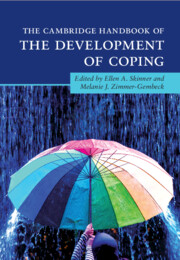Book contents
- The Cambridge Handbook of the Development of Coping
- Cambridge Handbooks in Psychology
- The Cambridge Handbook of the Development of Coping
- Copyright page
- Contents
- Contributors
- Preface
- 1 A Systems Perspective on the Development of Coping
- Part I Theoretical Perspectives on the Development of Coping
- Part II Methods for Studying the Development of Coping
- Part III Neurophysiological and Experiential Bases of the Development of Coping
- Part IV Psychological Foundations of the Development of Coping
- Part V Social Contexts and the Development of Coping
- 17 Coping Development as an Everyday Interpersonal Process
- 18 Parenting, Socialization of Emotion, and the Development of Coping
- 19 Temperament, Family Context, and the Development of Coping
- 20 Interparental Conflict, Parental Relationship Dissolution, and the Development of Children’s Coping
- 21 Autonomy, Self-Determination, and the Development of Coping in Adolescence
- 22 Peer Stressors and Peer Relationship Dynamics in the Development of Coping
- 23 Income, Income Inequality, Community, and the Development of Coping
- 24 Culture, Diversity, Context, and the Development of Coping
- Part VI Application and the Development of Coping
- Index
- References
21 - Autonomy, Self-Determination, and the Development of Coping in Adolescence
from Part V - Social Contexts and the Development of Coping
Published online by Cambridge University Press: 22 June 2023
- The Cambridge Handbook of the Development of Coping
- Cambridge Handbooks in Psychology
- The Cambridge Handbook of the Development of Coping
- Copyright page
- Contents
- Contributors
- Preface
- 1 A Systems Perspective on the Development of Coping
- Part I Theoretical Perspectives on the Development of Coping
- Part II Methods for Studying the Development of Coping
- Part III Neurophysiological and Experiential Bases of the Development of Coping
- Part IV Psychological Foundations of the Development of Coping
- Part V Social Contexts and the Development of Coping
- 17 Coping Development as an Everyday Interpersonal Process
- 18 Parenting, Socialization of Emotion, and the Development of Coping
- 19 Temperament, Family Context, and the Development of Coping
- 20 Interparental Conflict, Parental Relationship Dissolution, and the Development of Children’s Coping
- 21 Autonomy, Self-Determination, and the Development of Coping in Adolescence
- 22 Peer Stressors and Peer Relationship Dynamics in the Development of Coping
- 23 Income, Income Inequality, Community, and the Development of Coping
- 24 Culture, Diversity, Context, and the Development of Coping
- Part VI Application and the Development of Coping
- Index
- References
Summary
In this chapter, we argue that autonomy-related developmental processes are key for a more complete and deep-level understanding of the development of coping. We first discuss the critical role of autonomy in psychosocial growth, not only during adolescence but also throughout the lifespan. Then, we consider how autonomy-relevant experiences, and autonomy frustration in particular, trigger specific coping responses, and we discuss the developmental patterns of these coping responses and their implications for individuals’ psychosocial development. We then review how situation-specific characteristics of individuals’ context (e.g., the social domain and the degree of autonomy support in the situation) have implications for the unfolding of a coping episode. The chapters ends by discussing how proximal figures in one’s social context (with a particular focus on parents) can foster more adaptive and flexible coping, and how self-determination and mindfulness also serve as critical coping resources.
Information
- Type
- Chapter
- Information
- The Cambridge Handbook of the Development of Coping , pp. 510 - 537Publisher: Cambridge University PressPrint publication year: 2023
References
Accessibility standard: Unknown
Why this information is here
This section outlines the accessibility features of this content - including support for screen readers, full keyboard navigation and high-contrast display options. This may not be relevant for you.Accessibility Information
- 5
- Cited by
